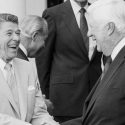Contributions of 3 of the Most Conservative U.S. Presidents
Conservatism is a difficult topic to discuss in today’s political climate. It is a word that has become emotionally charged and means something different to each person. The literal meaning of the word is a belief in the value of traditional and established practices in society and politics. For the purposes of American politics, this would indicate a belief in the principles and values of the Founding Fathers.
George Washington
George Washington became the first President of the United States in 1789. He is the only president in the history of the United States not to belong to any political party. It was during his tenure as president that the two political parties of the time became well defined; the Federalists and the Democratic-Republicans. President Washington was concerned with this development and during his farewell address, he warned of the dangers of a country becoming too divided by politics of the emerging political parties and of becoming too involved with the affairs of other nations.
In part, it was his refusal to seek a monarchy that allowed the republic to remain successful. He had to be persuaded to accept a second term in office and refused to take a third. His insistence that one person serving too long in a position of authority was bad for both the individual and the country helped define the two-term limit which is still in place.
James Monroe
James Monroe was the fifth President of the United States in 1817. He is most well known for the Monroe Doctrine which further supported the position that the United States would not become involved in foreign entanglements as long as they did not affect the New World directly. This single document helped determine the future of foreign policy for generations. Presidential autographs are one way to connect with the history of the nation. Whether they are on private documents or those that helped shape the nation, they are an important touch-stone to the past.
Monroe was a nationalist who wanted to rein in the involvement overseas that he believed to be detrimental to the growth and security of the United States. With the focus on the nation, the United States continued to expand. Five states were added to the union and the territory of Florida was acquired from Spain.
Monroe was strongly opposed to centralizing federal power and promoting federal spending. For the most part, he vetoed legislation that would use federal funds to promote state infrastructure. He preferred to leave the details of how each state was run to the states. During the Congressional turmoil centered around the admittance of slave states to the Union, he remained mostly out of the discourse so as not to be accused of meddling with the decisions of the legislative branch. However, he had deep concerns about the Constitutionality of placing restrictions on the admissions of a state.
Dwight D. Eisenhower
Dwight D. Eisenhower was a career soldier who became the 34th President of the United States in 1953. He became a Five Star General during World War II who avoided politics following the war. Much like the first president, he was eventually convinced that his country needed him to serve. During his administration, the nation cut federal spending.Interestingly, he is credited with the creation of the interstate highway system. He believed this to be an important move for the growth and security of the nation. It was implemented under the Federal Interstate Defense Highway Act. It provided a strategic advantage in defense scenarios, increased efficiency and limited the cost of interstate shipping, and promoted passenger travel.




